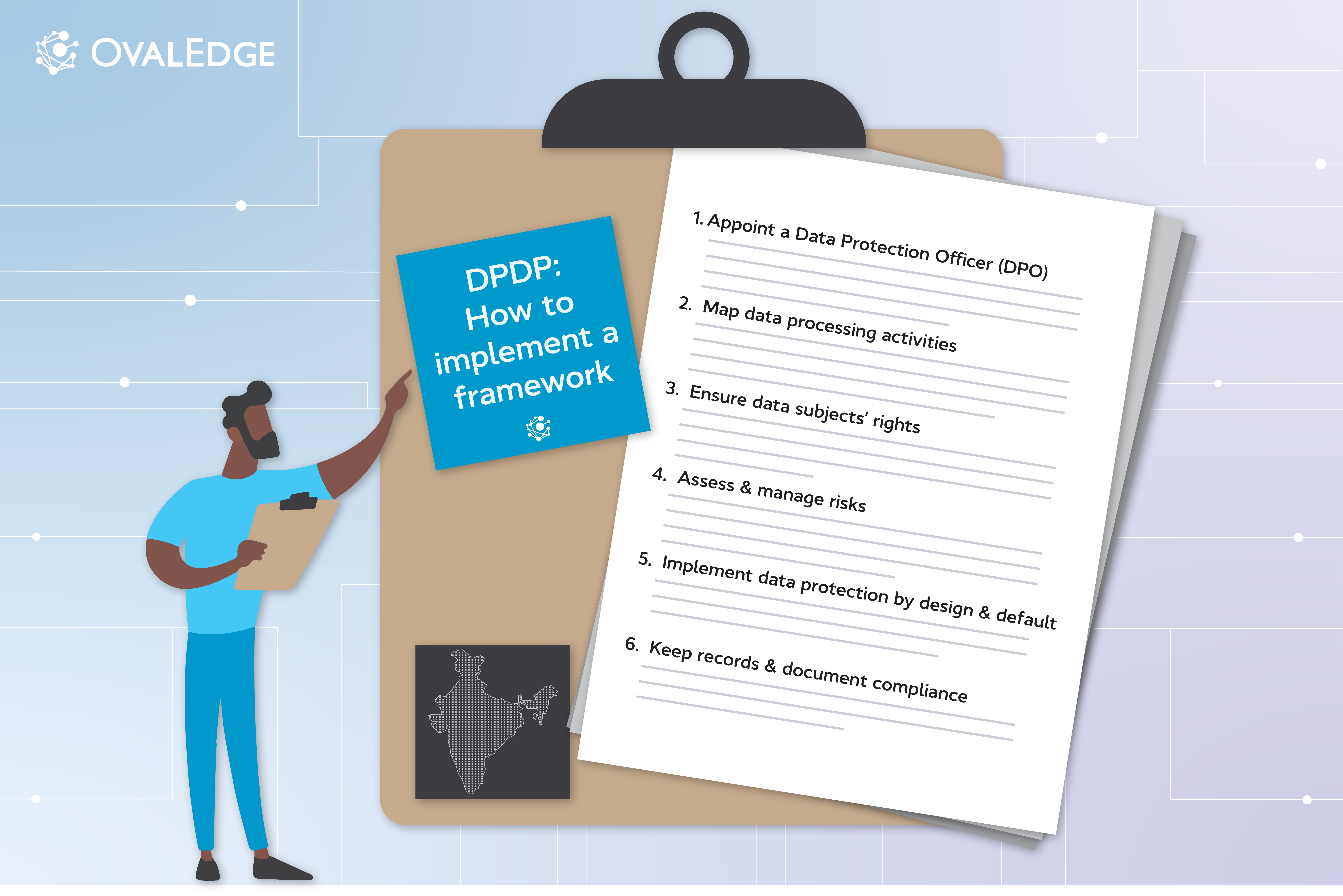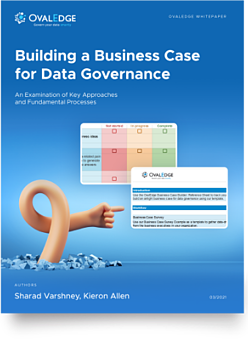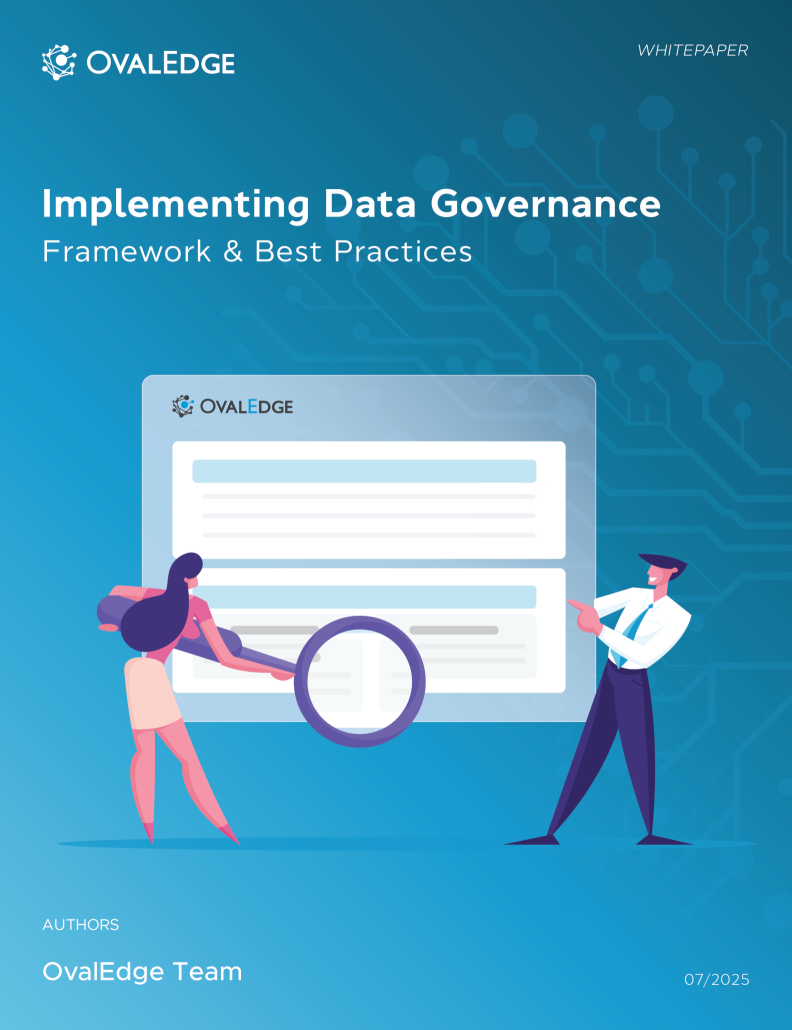Table of Contents

dpdp implementation - Best Practices and Insights
The Digital Personal Data Protection (DPDP) Act 2023 introduces a comprehensive framework for organizations in India to ensure the privacy, security, and lawful processing of personal data. Implementing the DPDP Act requires a well-planned strategy aligned with its compliance demands and protections for data subjects.
The DPDP Act, bearing similarities with the EU GDPR, is an overarching law to govern how personal data of data principals within the territory of India is used, processed, and disseminated. However, unlike the GDPR, which covers just over 742 million people, the DPDP Act is applicable to a population of over 1.4 billion.
The DPDP Act is applicable to processing of digitized personal data in India, and its application extends extra-territorially, when personal data processed outside India is related to offering of goods and services to data principals within the territory of India.
That means, regardless of where you or your organization is located , if you deal with digitized personal data of a data principal within the territory of India, you need to comply with the DPDP Act. In this article, we will explain how to do so and how, here at OvalEdge, we are already compliant and can quickly help you implement the guardrails required.
What is the DPDP Act?
Anyone familiar with existing data protection regulations of different countries will recognize the main features of the DPDP Act. The Act aims to ensure that the personal data, of any data principal within the territory of India, is protected and not misused and that processing of personal data is undertaken in a manner which will protect and recognize and retain the right to privacy of residents of India.
Some of the key features include:
- Applicable outside India in relation with goods or services offered in India.
- Identifying a lawful basis to collect and process personal data
- Executing valid contracts to engage data processors. Establishes compliance obligations on any entity or individual that handles personal data
- Ensuring information security procedures are in place to protect personal data
- Obtaining and verifying parental consent
- Upholding the rights of data subjects to access, correct, rectify, erase, and complete their data and withdraw their consent.
- Notifying affected data principals and the Data Protection Board of India in case of a data breach.
- Option to appoint a consent manager.
Failure to comply with the DPDP Act can result in significant fines and penalties up to INR 250 crores (approx USD 30.2 million) per breach.
To avoid the penalties associated with non-compliance, you need to implement a framework that adheres to the various aspects of the regulation. OvalEdge is 100% compliant with the DPDP Act and provides you all the tools you need to achieve compliance. Furthermore, having a local presence in India, we understand the full implications of the DPDP Act and are constantly tracking any developments and nuances in the law.
DPDP Act: How to implement a framework
1. Appoint a Data Protection Officer (DPO) or a designated person in charge of data protection
You need a DPO to oversee your compliance efforts, if you qualify as significant data fiduciary. If not, you need to appoint any designated individual who is responsible to oversee all activities regarding data protection and will be able to answer on your behalf. This can be someone already working in your data team or an external hire. They will be the primary point of contact for data protection authorities and data principals. The roles and responsibilities of a such an officer include monitoring internal compliance, managing budgets and making acquisitions of relevant compliance tools, advising executives on data protection obligations, liaising with regulatory authorities and handling the requests of data principals.
Your DPO must have experience implementing data protection strategies for other similar regulations, like the GDPR. Although the DPDP Act is new, this knowledge of compliance procedures, such as corresponding with government authorities and auditors, is vital.
OvalEdge can help you to facilitate this by defining data governance roles and responsibilities so everyone in your organization understands who to contact for specific data questions or concerns.
Related Post: 3 Data Privacy Compliance Challenges that can be solved with Data Governance
2. Map your data processing activities
All data processing activities within your organization must be documented. These include actions like third-party reporting, analytics, marketing communications, contract processing and more.
You need to identify and keep track of all the personal data you collect during these processes, on what ground the personal data is processed, how it's used, where it's stored, how long it will be stored for, who is the process owner and who has access to it. One of the biggest challenges companies face is locating this personal data and relevant details regarding the myriad of personal data sets. It’s a complex problem that requires a specific solution-based tool or methodology.
Through data crawling and classification, OvalEdge automatically identifies and classifies and maps the all the personal data with your organization. Furthermore, data lineage facilities in OvalEdge enable you to track all the changes made to data from its inception, while the data catalog allows you to identify the location of all your data assets.
3. Ensure data subjects' rights
You must ensure that every data principal you deal with understands how to exercise their rights under the DPDP Act , such as the right to access, rectify, delete their data, file a complaint, withdraw their consent or nominate another person to exercise their rights under the Act and have measures in place to deal with these requests. You must implement a process in your organization that collects data requests from data prinicpals and, based on the specific subject rights as defined by the DPDP Act.
This process will enable you to create a workflow for how requests are handled and addressed. Ultimately, receipt of requests and action processes must be documented.
Through OvalEdge, this process is automated. Requests are received and forwarded directly to the correct stakeholder and the entirety of the process is documented by default.
4. Assess and manage risks
You must conduct a Data Protection Impact Assessment (DPIA) for any high-risk data processing activities, such as collecting personal data, biometric and other sensitive data, using new technologies to collect data, and large-scale profiling. As well as evaluating the potential impact on data principals’ rights, you need to have adequate measures in place to mitigate those risks.
For this, you need to understand the entire data landscape of your organization. This will enable you to know where these high-risk profiling activities are taking place and who is undertaking them.
OvalEdge enables you to identify all of the data connectors in your organization and catalog what and where your high-risk data is. Furthermore, data quality checks and other governance measures ensure data is well organized and suitable for the intended use cases.
Related Post: What is a Data Catalog? The Ultimate Guide
5. Implement data protection by design and default
Data protection measures cannot be an afterthought. They must be fully integrated into your processes and systems. Ultimately, this means monitoring data protection at every stage of a workflow.
You must ensure that any new data, programs, or applications that enter your organization or follow the processes you have to ensure it is compliant and personal data is protected. There must be a specific action item in place.
OvalEdge deploys multiple features that ensure you can track your data projects, from internal conversations to data changes and specify the compliance requirements.
6. Keep records and document compliance
To stay compliant with the DPDP Act, entities must maintain detailed records of data processing activities, DPIAs, and other relevant documentation that can, if required, be presented to auditors to demonstrate its compliance with the DPDP Act.
In OvalEdge, this documentation process is integrated out-of-the-box. A built-in audit log is continually updated by default.
In simple words,
Implementing DPDP involves a multi-step approach incorporating policy development, technical and organizational measures, and ongoing compliance monitoring. Key steps include:
- Conducting an initial data audit to understand what personal data is collected, processed, and stored.
- Defining clear roles such as Data Protection Officer (DPO) and establishing governance committees.
- Drafting and enforcing policies that specify lawful processing, data minimization, purpose limitation, and data subject rights.
- Implementing privacy by design and default principles in system architecture and processes.
- Maintaining comprehensive records of processing activities and conducting Data Protection Impact Assessments (DPIA) for high-risk processing.
- Training employees and raising awareness about DPDP compliance requirements.
Related Post: Building a Business Glossary - Why and How
The OvalEdge DPDP Act Checklist
To further your understanding of the core rules and requirements of the DPDP, we’ve put together a comprehensive checklist that not only states the specific compliance regulation, but translates it from a complex, technical description into plain English. What’s more, with each section of the regulation, we explain the severity of the regulation and how OvalEdge can enable you to remain compliant without committing to the many hours of manual work required without a dedicated tool in place.
DPDP Compliance and Checklist
To operationalize DPDP readiness more effectively, organizations should follow a structured dpdp compliance checklist that complements the foundational steps already discussed.
This checklist strengthens execution by focusing on governance, technology, and accountability:
-
Perform enterprise-wide personal data discovery and maintain an updated data processing register
-
Clearly document lawful purposes and maintain verifiable consent records
-
Implement role-based access controls and continuous access monitoring
-
Define retention schedules aligned with legal and business requirements
-
Automate data deletion and anonymization workflows
-
Establish vendor risk assessments and DPDP-aligned data processing agreements
-
Maintain incident response playbooks and breach notification workflows
-
Conduct periodic compliance audits and control effectiveness reviews
Most Effective Ways to Architect Systems for DPDP Compliance
Beyond policies and processes, compliance success depends heavily on system design. The most effective ways to architect systems for DPDP compliance involve embedding privacy controls directly into the technology stack.
Key architectural strategies include:
-
Privacy by design: Embed consent enforcement, purpose limitation, and minimization into core workflows
-
Layered architecture: Separate data ingestion, compliance orchestration, and processing layers to reduce risk
-
Centralized policy enforcement: Use APIs or middleware to enforce consent and access rules consistently
-
Modular compliance components: Enable scalable updates to consent, retention, and rights-management modules
-
Automated governance: Continuously monitor data usage and generate audit-ready logs
-
Lifecycle-driven data management: Ensure data is collected, stored, retained, and deleted in alignment with DPDP mandates.
Conclusion
Implementing DPDP compliance is both a regulatory requirement and a strategic advantage. By following a structured compliance checklist and adopting the most effective ways to architect systems for DPDP compliance, organizations can build trust, reduce risk, and enable scalable data practices that align with evolving expectations. These approaches transform compliance from a one-time project into an ongoing capability. If you are ready to take the next step and see how OvalEdge can help you streamline your compliance journey with practical tools and expert support, schedule a personalized demo here.
FAQs
1. What is a DPDP compliance checklist?
A DPDP compliance checklist is a structured set of operational, technical, and governance actions required to meet India’s Digital Personal Data Protection Act obligations.
2. Why is system architecture important for DPDP compliance?
Well-designed architecture ensures consent enforcement, data minimization, and access control are applied automatically and consistently across systems.
3. How often should DPDP compliance be reviewed?
Organizations should conduct periodic reviews and audits, especially when business processes, vendors, or regulations change.
4. Can DPDP compliance be automated?
Yes. Consent management, access controls, retention enforcement, and audit logging can be significantly automated through modern privacy engineering practices.
5. Who is responsible for DPDP compliance within an organization?
While accountability lies with leadership, effective compliance requires coordination across legal, IT, security, and data governance teams.
Book a call with us to find out:
|
OvalEdge recognized as a leader in data governance solutions
.png?width=1081&height=173&name=Forrester%201%20(1).png)
“Reference customers have repeatedly mentioned the great customer service they receive along with the support for their custom requirements, facilitating time to value. OvalEdge fits well with organizations prioritizing business user empowerment within their data governance strategy.”
.png?width=1081&height=241&name=KC%20-%20Logo%201%20(1).png)
“Reference customers have repeatedly mentioned the great customer service they receive along with the support for their custom requirements, facilitating time to value. OvalEdge fits well with organizations prioritizing business user empowerment within their data governance strategy.”
Gartner, Magic Quadrant for Data and Analytics Governance Platforms, January 2025
Gartner does not endorse any vendor, product or service depicted in its research publications, and does not advise technology users to select only those vendors with the highest ratings or other designation. Gartner research publications consist of the opinions of Gartner’s research organization and should not be construed as statements of fact. Gartner disclaims all warranties, expressed or implied, with respect to this research, including any warranties of merchantability or fitness for a particular purpose.
GARTNER and MAGIC QUADRANT are registered trademarks of Gartner, Inc. and/or its affiliates in the U.S. and internationally and are used herein with permission. All rights reserved.


.webp)


